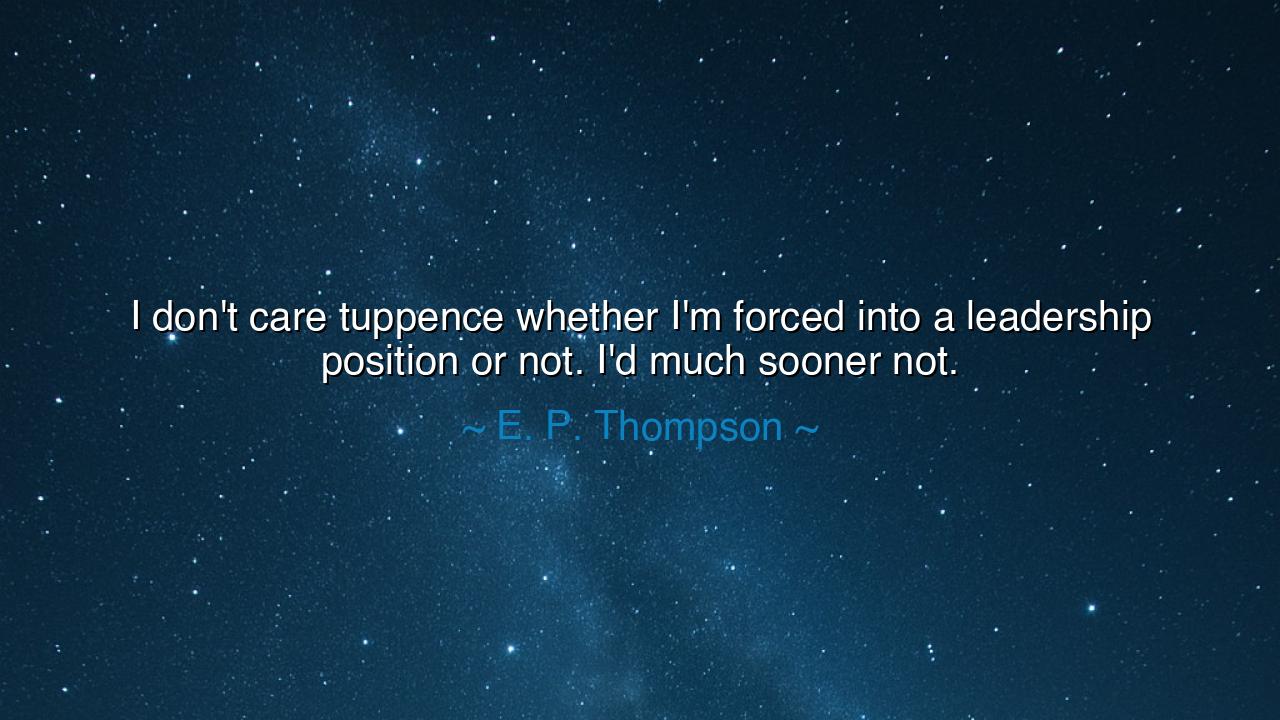
I don't care tuppence whether I'm forced into a leadership
I don't care tuppence whether I'm forced into a leadership position or not. I'd much sooner not.






The words of E. P. Thompson, historian, activist, and moral thinker, echo with rare humility: “I don’t care tuppence whether I’m forced into a leadership position or not. I’d much sooner not.” In a world intoxicated by power and fame, these words stand like a quiet mountain—unmoved, noble, and true. They remind us that leadership, when divorced from duty, becomes vanity; and that the greatest leaders are often those who never sought to lead, but were drawn forth by the demands of conscience and circumstance. Thompson’s declaration is not the cry of cowardice, but the confession of a man who values truth above glory, service above rank, and integrity above acclaim.
To understand the origin of this quote, one must look to the man himself—Edward Palmer Thompson, one of the 20th century’s most influential historians and moral voices. He was the author of The Making of the English Working Class, a monumental work that gave voice to the forgotten—the laborers, artisans, and dreamers whose sweat and struggle shaped modern democracy. But Thompson was not merely a scholar; he was a fighter for justice, a man who stood against nuclear armament and political oppression in postwar Britain. His words about leadership came during a time when he was being pressed to take a more public, formal role in the movements he supported. He resisted—not from weakness, but from a deep conviction that the purity of one’s work can be clouded by the lust for authority. In refusing leadership, he affirmed the ancient truth that humility is the root of greatness.
In this spirit, his words recall the wisdom of the ancients. Lao Tzu, the sage of China, once wrote that the best leader is one whom the people barely notice—who leads without self-interest, and when the work is done, the people say, “We did it ourselves.” So too did Thompson believe that movements should not be ruled by figureheads, but sustained by shared conviction and collective strength. To him, the value of a cause lay not in its leaders, but in its community—in the minds and hearts united toward justice. By rejecting personal ambition, he aligned himself with a lineage of reluctant leaders—Cincinnatus, who left his plow to save the Roman Republic and returned to his fields when the work was done; George Washington, who wished to retire to Mount Vernon but answered the call of his nation; and Nelson Mandela, who endured long years in prison not for power, but for principle.
Thompson’s words also strike against the modern disease of ego, the endless hunger to be seen, celebrated, and followed. In every age, people clamor for titles and positions, mistaking leadership for domination rather than stewardship. But Thompson, like the wise before him, knew that true leadership is a burden, not a crown. It demands sacrifice, not self-glory. Those who chase it often lack the soul to bear it, while those who avoid it are often the ones most fit to carry its weight. His refusal, therefore, was not rebellion against leadership, but rebellion against false leadership—the kind built on pride, politics, and personal ambition rather than service, wisdom, and truth.
Consider, for example, the story of Mahatma Gandhi. He never sought to be a leader; he sought only to live according to conscience—to resist injustice through nonviolence and truth. Yet through humility and moral power, millions followed him. When independence came, he refused political office, knowing that his role was to awaken the soul of his people, not to rule them. Gandhi, like Thompson, understood that leadership is not proclaimed—it is revealed in the quiet strength of those who act for the good of all, regardless of recognition. Such men remind us that the world is not changed by those who crave power, but by those who are compelled to act when conscience leaves them no choice.
Thompson’s humility also carries a subtle warning to all who live in the age of spectacle. To seek leadership for its own sake is to build upon sand. It blinds the spirit with pride and estranges the leader from the people. When a man leads for himself, he governs through fear and vanity; when he leads for truth, he governs through example. The wise, therefore, do not seek the stage—they seek the work. And if leadership finds them, they accept it as one accepts a sacred duty, not a privilege. Thompson’s “I’d much sooner not” is not evasion—it is the sigh of a man who knows how heavy the mantle of leadership truly is.
From this quote, we inherit a lesson both moral and practical. Do not chase power; chase purpose. Do not seek to command others until you have mastered yourself. If you find yourself called to lead, lead humbly, remembering that authority is not your possession but your responsibility. Let your deeds speak louder than your ambition, and when praise comes, pass it on to the people who walked beside you. The truest leader is not the one who stands above all, but the one who stands among all, steady and silent, guiding by the light of example rather than the noise of pride.
Thus, the wisdom of E. P. Thompson endures as both shield and mirror. It shields us from the corruption of ego and mirrors the nobility of service. His refusal to hunger for leadership teaches us that greatness is not measured by position, but by principle—by the willingness to serve without reward, to act without applause, and to build a better world without needing one’s name engraved upon it. For in the end, it is the humble who lead with truth, and it is truth—not ambition—that lights the path through the ages.






AAdministratorAdministrator
Welcome, honored guests. Please leave a comment, we will respond soon